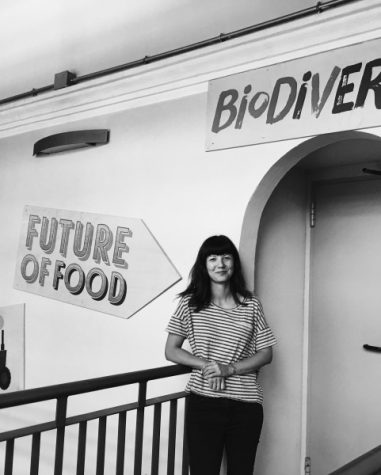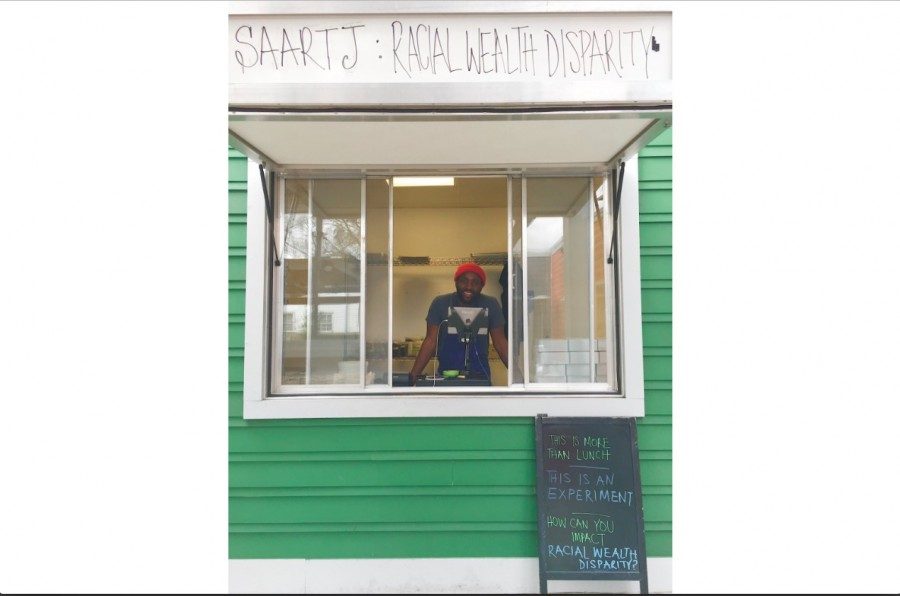Pop-up counter Saartj serves customers taste of wealth disparity through prices
Courtesy of Anjali Prasertong
Saartj, the pop-up lunch counter, offered visitors the opportunity to address the issue in a provocative way.
For lunch-goers looking for a side of social discourse with their sandwiches, a shop opened up at the Roux Carre Market last month prompting discussion about racial wealth disparity in New Orleans. Saartj, the pop-up lunch counter, offered visitors the opportunity to address the issue in a provocative way by charging white customers $30, rather than the listed $12, to reflect New Orleans’ wealth disparity.
While white customers had the opportunity to choose whether to pay the higher price after having the experiment explained to them, customers of color were not able to pay the higher price, though some offered. The project, conceptualized by writer, chef and activist Tunde Wey, was not intended to turn a profit, but rather to draw attention to and prompt conversations regarding the racial wage gap in New Orleans.
Just fostering these conversations is something Anjali Prasertong, Tulane School of Public Health and Tropical Medicine student, feels is key in addressing issues like this one.
“I think that’s just the big thing is just getting out of your comfort zone, striking up conversations with people,” Prasertong said. “I mean the amazing thing about New Orleans is that people here are so friendly, just having those conversations with people and trying to understand their point of view a little bit better.”
Prasertong worked alongside Wey to see the social experiment through, taking on a data coordinator role. She helped develop the survey tools used in the project, designed interview questions and analyzed the data when the project concluded. As a graduate student in nutrition, the chance to address public issues like wealth disparity in the context of food appealed to her.
“Most research is pretty … I guess, more academic and conservative,” Prasertong said. “And his idea is pretty provocative and in a way feels like an art piece, where the point is not to necessarily collect data about people. The point is just to kind of surprise people and see what their reaction is.”

Anjali Prasertong, Tulane School of Public Health and Tropical Medicine student worked as a data coordinator at Saartj.
Prasertong works with the Healthy Corner Store Collaborative, which focuses on increasing the number of healthy, fresh options in stores around the city, as a part of her practicum, but her passions are not solely in nutrition. A large part of what drew Prasertong to Wey’s project was her participation in an Undoing Racism Workshop last summer.
“I did [the workshop], and it was just pretty eye-opening and life-changing, just kind of changing how I looked at nutrition and food and all kinds of things. And it made me specifically want to target racism in the food system,” Prasertong said.
The results of the social experiment were unexpected for both Wey and Prasertong, who had concerns about protests and angry patrons: 78 percent of white customers paid the higher fee with 91 percent of white women doing so. The willingness of white people to pay the higher fee could be attributed to many different factors, such as social pressure, women relating to the feeling of discrimination and wealth inequality, concerns of judgment from friends or other patrons and moral obligation, but the trend was a surprise to the organizers.
The intent of the experiment was advertised on a sign outside the lunch counter, which Prasertong said he thinks may have deterred some of the people who would have been most opposed to paying the extra fee or discussing racial income disparity. For the most part, however, customers were willing to answer questions and engage with Wey and Prasertong, and many entered into the experiment with some background knowledge on the issue already.
In New Orleans the median income for African American households is $25,806. It’s $64,377 for white households. Thats the reasoning behind diff prices at this Roux Carre lunch counter: https://t.co/CV6OhTMqoO
— Fernanda Zamudio-Suarez (@FernandaZamudio) March 7, 2018
“I feel we are, as a society, really divided, and if you go out of your way to kind of make personal connections with people who are experiencing these issues, then it becomes a more personal issue for yourself,” Prasertong said. “And you’re probably more likely to make choices that are going to try to fix the problem, rather than maybe choices that are based on self-interest.”
Your donation will support the student journalists of Tulane University. Your contribution will allow us to purchase equipment and cover our annual website hosting costs.




Leave a Comment